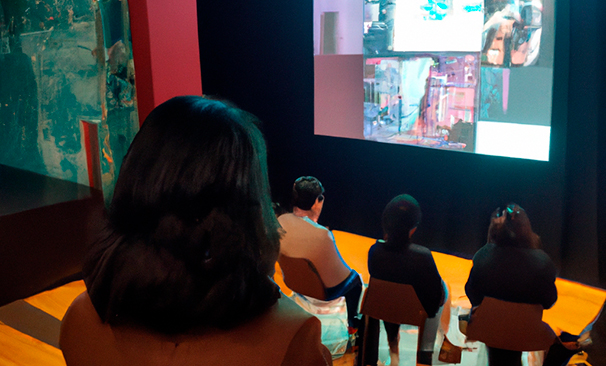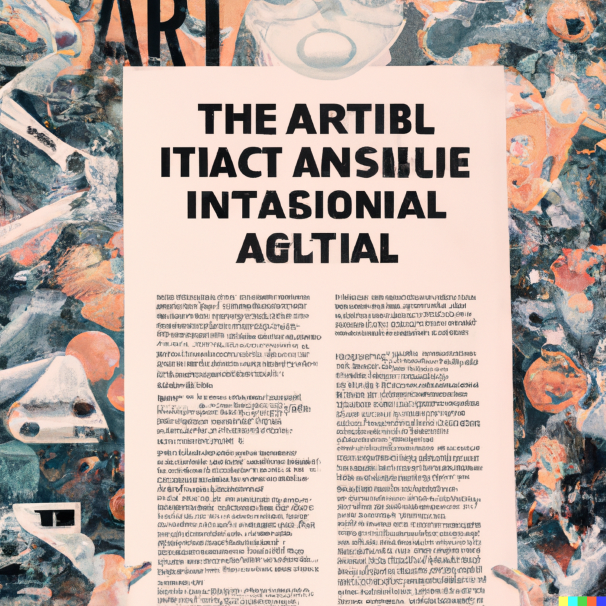What are you looking for?
You might be looking for...
Creative manifesto for a critical AI future
Open call for artists & researchers
Prior registration limited to 30 people:
bit.ly/Creative-Manifesto-Open-Call
Registration expiry date: 13.11.2023

Over the last year, text and image creation applications such as ChatGPT or Dall-e, in which the user delegates the act of creation to the AI, have become mainstream all over the world. Millions of artistic works, images, exhibitions, books and even entire newspapers have been recently produced using this apps, which implies a transformation of how human action relates with the artistic authorship.
The great speed of this transformation leads the creative sector to deep doubts, fears and questions: are these applications truly creative? How should we react to this new reality? What is the new position of the professional art towards an automation process that threatens its own survival?
The questions surrounding the deployment of AI as a creative agent are existential, but also social, political and economic. And all these become urgent for the speed and absence of regulation in which this transformation is taking place. Should we call for limits? Do we need to reach agreements so that the artistic and technological sectors can advance along parallel paths without hindering each other?
Santa Mònica Arts Centre in Barcelona has scheduled an intensive workshop to address all these urgent issues. On December 1st, 2023, international specialists will meet and publicly present their ideas for the drafting of a cultural manifesto aimed at people responsible for developments in AI. Far from denying or stopping the technological reality in which we are immersed, this manifesto has to outline the concerns and demands of the creative sector upon the ongoing automation processes and their dangers.
This workshop is planned to be the first of a list of further events that will take place in several European artistic institutions.
This project is curated by Andrew Keen and Enric Puig, and will feature contributions by: Margaret Heffernan, Stephen Marche, Viktor Mayer-Schonberger, Joana Moll, Joan Soler-Adillon, the asynchronous audiovisual contribution of Hito Steyerl, and others to be confirmed.
Open call for artists & researchers
The Santa Mònica Arts Centre calls on artists and researchers interested in attending the intensive workshop in Barcelona on December 1st, 2023.
The workshop is open to all those attendees who are involved from the artistic sector with AI, not necessarily working with it, but concerned about the issue of its advance in the arts and wishing to hear the first contributions from experts with the aim of jointly continuing to work towards the final version of the manifesto.
In addition to the draft of the manifesto, which is expected to be finalized in early 2024, Santa Mònica Arts Centre also raises the possibility of holding a big exhibition based on the results of this conversation and the manifesto itself. Some of the people attending the workshops may participate in this possible exhibition, that would open to the public throughout 2025.
The workshop will be held exclusively in English.
To apply, just complete the following online form before 13 November 2023:
bit.ly/Creative-Manifesto-Open-Call
Participation is free with limited capacity up to 30 people who will be selected based on the motivation expressed in the application form.
Those interested in attending in person the workshop but who do not have an institution to support their trip can let Santa Mònica know through the form, who will study each case and pay up to €500.

Participants:
Azahara Cerezo investigates the scope and effects of digitizing processes in the territory, understanding it as a knot of elements linked to the experience of space and time, corporeality, the fragmentation of work or the crystallization of memory. Halfway between the hyperlocalized and the delocalized, her artistic practice wants to reflect on the limits of specific topics in their relationship with broader issues, such as unfinished historical conflicts or the violence of a capitalism that acts by dispossession. www.azaharacerezo.com
Andrew Keen (moderator). Named as one of the “100 most connected men” by GQ magazine, Andrew Keen is amongs the world’s best know broadcasters and commentators. He produces and presents Keen On, the popular daily online podcast. He is the host of the long-running show, How To Fix Democracy and directed and wrote the eponymous 2020 movie. He is the author of four acclaimed books: Cult of the Amateur, Digital Vertigo, The Internet Is Not The Answer, and How To Fix The Future. www.ajkeen.com
Stephen Marche is a novelist and essayist, and the author of, among other works, On Writing and Failure and The Next Civil War. He has written features and essays for The New Yorker, The New York Times, The Atlantic, Esquire, The Walrus and many others. He has collaborated with artificial intelligence on the first AI-generated novel reviewed in The New York Times, Death of an Author. His most recent novel, The Last Election, was co-written with Andrew Yang. www.stephenmarche.com
Joana Moll is an artist and researcher living halfway between Berlin and Barcelona. Her work is a critical exploration of the way in which post-capitalist narratives affect the literacy of Machines, humans and ecosystems. Her main lines of research include the materiality of the Internet, surveillance, the analysis of social profiles and interfaces. She has presented, exhibited and published her work at different museums, art centres, universities, festivals and in publications all over the world such as such as Venice Biennale, MAXXI, MMOMA, CCCB, ZKM or the Ars Electronica. Her work has been featured on The Financial Times, Der Spiegel, National Geographic, Wired and Vice. Furthermore, she is co-founder of the research group Critical Interface Politics, with its base at Hangar, and co-director of the Institute for the Advancement of Popular Automatisms. www.janavirgin.com
Joan Soler-Adillon is an artist and associate professor at Universitat Oberta de Catalunya (UOC), in Barcelona. His research and practice revolve around digital interactive media and its manifestation in digital art –particularly interactive installation, interactive storytelling and documentary, and virtual reality. From a full-body interactive game run on an inflatable slide, to a VR-based experimental documentary, he has participated in a myriad of projects with a focus on both behaviour design and interactivity, and on fostering the audience collaboration and participation. en.joan.cat
With the online participation of:
Margaret Heffernan is author of six books and produced programmes for the BBC for 13 years. She then moved to the US where she spearheaded multimedia productions for Intuit, The Learning Company and Standard&Poors. She was Chief Executive of InfoMation Corporation, ZineZone Corporation and then iCast Corporation, was named one of the "Top 25" by Streaming Media magazine and one of the "Top 100 Media Executives" by The Hollywood Reporter. She is currently a professor of Practice at the University of Bath, Lead Faculty for the Forward Institute's Responsible Leadership Programme and, through Merryck & Co., mentors CEOs and senior executives of major global organizations. mheffernan.com
Viktor Mayer-Schonberger is the Professor of Internet Governance and Regulation at Oxford. His research focuses on the role of information in a networked economy. Earlier he spent ten years on the faculty of Harvard’s Kennedy School of Government. He has published eleven books, including the international bestseller Big Data: A Revolution That Will Transform How We Live, Work, and Think (HMH, 2013) and Delete: The Virtue of Forgetting in the Digital Age (Princeton, 2009). He is also the author of over a hundred articles and book chapters on the economics and governance of information. Currently, he is a member of the German Digital Council and the AXA Data Protection and Ethics Panel.
With the asynchronous audiovisual participation of:
Hito Steyerl is a filmmaker, visual artist, writer, and innovator of the essay documentary. Her prolific filmmaking and writing occupies a position between the fields of art, philosophy and politics. Steyerl’s writing is thematically unified around a deep exploration of late capitalism’s social, cultural and financial imaginaries. Her films and lectures have increasingly addressed the presentational context of art. Steyerl has exhibited widely, most recently in solo exhibitions at the National Museum of Modern and Contemporary Art, Seoul and the Stedelijk Museum, Amsterdam in 2022. Her writing has circulated extensively through publication in both academic and art journals.